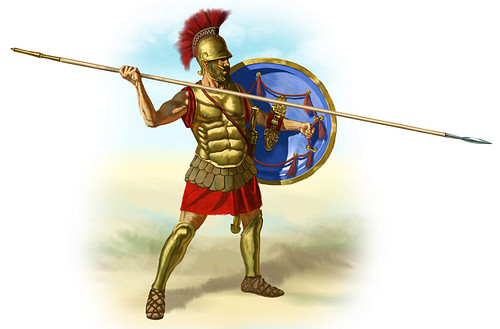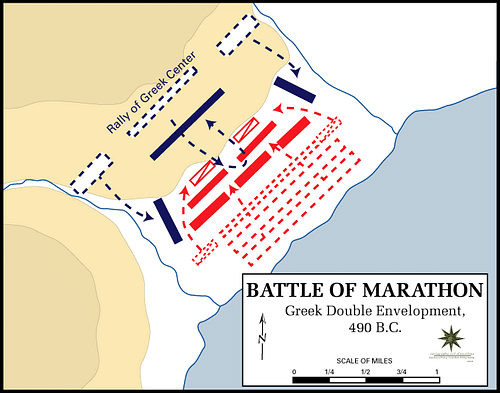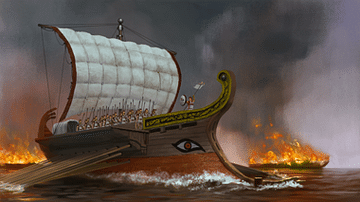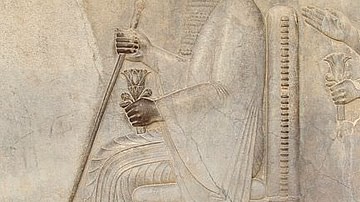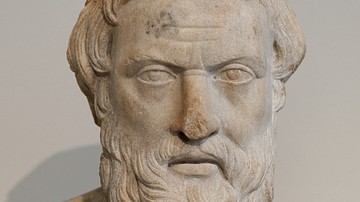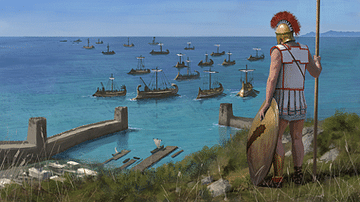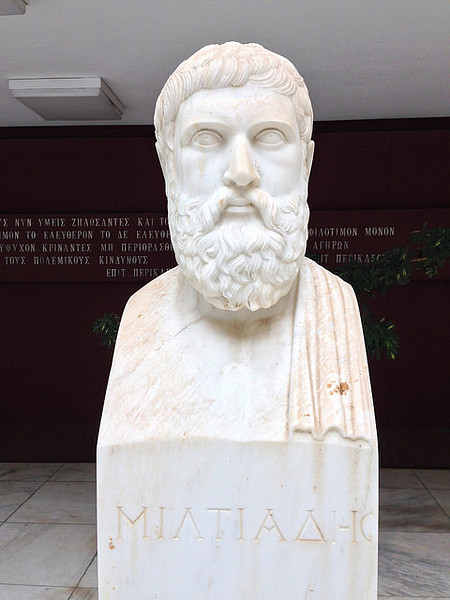
Miltiades (c. 555-489 BCE) was the Athenian general who defeated the Persians at the Battle of Marathon in 490 BCE. The Greeks faced a Persian force of superior numbers led by the commanding admiral Datis, who had been sent by their king Darius I (549-486 BCE) to invade and subjugate Greece.
At the Battle of Marathon, Miltiades recognized that traditional Greek strategy would never succeed against the larger Persian force and adopted a completely unexpected tactic which broke the Persian lines, won the battle, and saved Greece from Persian domination. Although he was initially hailed as a great hero, the Athenians had a short memory and, after he was later defeated and dishonored, they imprisoned him on charges of treason. He died in prison from an infection of an untreated wound. Later generations would recognize his genius and accomplishments, however, and today he is honored as a national hero.
Early Life & Reign
Miltiades was the son of Cimon of Athens, an aristocratic charioteer well known for his success in the Olympics. Cimon was a member of the wealthy and highly regarded Philaid clan, and Miltiades was educated by the best teachers and groomed for success in politics. He inherited a kingdom in Asia Minor in his twenties when his brother, Stesagoras, died without any children to leave his estate to. This kingdom was in the Chersonese, north of the site of ancient Troy, and had proved a very prosperous holding for Miltiades' family. The people, however, had grown tired of the rule of the Philaid clan prior to his brother's death. They hoped, in fact, that since their king had died without an heir, they would now be left to govern themselves; but this was not to be.
When Miltiades arrived in the Chersonese, he already knew that he would have trouble with the people and expected tiresome visits from the elders of the community who would attempt to repeatedly outwit and manipulate him. He had no interest in letting them waste his time and energy, and so when he took up residence in his new palace, he closed all his doors and shutters and refused to go out among the people, acting as though he was in mourning for the death of his brother.
When the Chersonesian elders came to his home in a group to offer their condolences on his loss, Miltiades had his guards arrest them on charges of treason. The elders were imprisoned, and Miltiades then set about governing his new kingdom without further interference or annoyance. The Greek historian Herodotus claims that, unlike his uncle or brother before him, Miltiades saw what needed to be done and did it; thus securing his rule of the kingdom quickly. He consolidated his position soon after this by marrying a Thracian princess named Hegesipyle, daughter of the neighboring king Olorus, sealing an alliance against any future troubles.
Miltiades as Vassal to Persia
Whatever poor policies his brother and uncle had enacted Miltiades avoided, and proved himself an effective ruler. He defeated the Scythian invaders who made regular incursions into the kingdom and conquered the islands of Lemnos, Imbros, and Tenedos for Athens, which greatly elevated his status and that of his kingdom. In 513 BCE Darius I invaded, and Miltiades surrendered accepting his new position as vassal to the Persian Empire. In this capacity, he had no choice but to join his new ruler in an expedition against the Scythians, and then against the Greek colonies in Asia Minor. These colonies revolted against Persian rule in 499 BCE, and Miltiades supported them secretly and helped with dispensing further aid from Athens.
When the Persians put down the revolt in c. 495 BCE, Miltiades' part in the troubles was revealed, and he fled to Athens for safety. His son Metiochus was captured by the Persians at this time but, because he came of a noble house of a former vassal, his life was spared and he lived very comfortably as a prince in Persia. Miltiades was pursued by Phoenician allies of Darius but evaded them. He reached Athens with the rest of his family, where he was welcomed but then almost instantly brought up on charges of tyranny stemming from his reign in the Chersonese. The Athenians dismissed the charges as fabrications of Persian sympathizers, and Miltiades and his family settled into the comfortable life of upper class Athens.
The Persian Invasion
Darius I could not abide the arrogance of the Athenians or the insult of the colonies' revolt. He sent emissaries to the Greek city-states demanding their submission to Persian rule. Almost all of the Greek states refused him, but the island of Aegina agreed and became a Persian vassal state. Aegina, centrally located between Piraeus - the port of Athens - and Corinth - an important trade center near Sparta - threatened the commerce of both city-states as a Persian vassal. Athens and Sparta demanded that Aegina withdrew its pledge to the Persian king, but Aegina refused. The tensions between the city-states flared and gave Darius the excuse he needed to invade Greece in order to protect his new vassal. Darius knew that Athens had been behind the rebellion and, of course, that they had welcomed Miltiades, who had betrayed him. Darius sent his general Mardonius to the north of Greece, where he conquered the Macedonian region in 492 BCE but lacked the men and resources to march south on Athens itself. Darius then decided to invade mainland Greece and destroy Athens directly, eliminating any further threat to his control of Asia Minor and avenging himself for Athens' affront to his rule.
The war between Greece and the Persian Empire is often depicted strictly along nationalistic lines, where there were Persians on one side of the conflict and Greeks on the other, but this is not so. As the example of Aegina illustrates, the Greek city-states were not unified as a nation, and there were many Greeks who favored the unity and protection of the Persian Empire. Although this may seem strange, that Greeks would prefer Persian rule, it must be remembered that the Persian Empire was the greatest the world had known at the time while the Greek city-states were small, independent political units who fought incessantly with each other.
There was no national Greek army, economy, or even culture; each city-state considered itself a nation unto itself. Persia offered a much more stable and all-encompassing social construct than the city-states of Greece, and there were a number of Greeks who keenly appreciated this. When the Persians invaded Greece in 490 BCE, they were at first successful due to the intelligence Greek sympathizers supplied them with. The Persians swiftly captured the strategically important island of Naxos, then Delos, and then Eretria, whose gates were opened to them by Persian supporters, and were then in position to invade the mainland at the port known as Marathon.
Preparations for Battle
The Greeks hastily mobilized their forces to repel the invasion but, as usual, lacked cohesion, and so a unified army was not ready at hand. The Athenian army of hoplites was drawn from the citizenry and readied themselves quickly, but of the other city-states, only the Plataeans joined the resistance with a force of 400. The Spartans could not participate because of a religious ritual (though they pledged to join as soon as they could), and the other city-states had their own obligations and problems which prevented them. Miltiades was one of ten generals commanding the largely Athenian force which eventually marched to meet the Persians. Each day, one of the generals assumed supreme command of the army while a polemarch (a war counselor) named Callimachus, who was not one of the ten, would oversee operations and render advice and decisions on battle plans.
The Persian force under Datis numbered over 20,000 infantry with additional cavalry and other units including archers. Their force also included the elite warriors known as The Immortals, so called because when one fell another instantly took his place. The Immortals were considered invincible. The Greeks, on the other hand, had only been able to muster 10,000 infantry and had neither cavalry nor archers. The plains of Marathon were flat and well suited to a cavalry charge. The ground also favored the Persian archers over the Greek infantry.
Historian Kelly DeVries notes that "when the Athenians saw the immense size of the Persian force at Marathon they wavered in their decision to fight them there. A dispute arose in the war council between those who favored withdrawal, at least until the arrival of the Spartans, and those who desired to do battle" (46-47). Sparta was said to be on the march, and additional forces could arrive at any moment; some generals argued they should, therefore, delay any action. Other commanders pointed out how any traditional charge across the open ground at Marathon, with or without reinforcements, would be extremely difficult because of the strength of the Persian cavalry and opportunities for their archers. The longer they argued, the stronger the Persian position grew, they claimed, and an attack should be mounted without delay.
Miltiades favored the latter plan, and historians have speculated that he may have been motivated by revenge for having been driven from his kingdom by Darius. The suggestion that they wait until reinforcements arrived from Sparta was a reasonable one, and, as it turned out, the Spartans reached Marathon the day after the battle. It has also been noted that Miltiades chose to press for the attack on a day when he would be the supreme commander and so would receive the glory of a decisive victory. His desire for revenge would be understandable, but this motivation as his sole reason for pressing for attack is only speculation. The generals' opinions on whether to attack or delay were divided - with five voting to attack and five to wait - until Miltiades appealed personally to Callimachus to render a decision to break the tie. Herodotus reports that Miltiades carefully explained the situation to Callimachus, saying:
If we do not fight, I look to see a great disturbance at Athens which will shake men's resolutions, and then I fear they will submit themselves, but if we fight the battle before any unsoundness show itself among our citizens, let the gods but give us fair play, and we are able to overcome the enemy. On you therefore we depend in this matter, which lies wholly in your own power. You have only to add your vote to my side and your country will be free, and not free only, but the first state in Greece. Or, if you prefer to give your vote to them who would decline the combat, then the reverse will follow (Histories, 6.109).
Callimachus was persuaded and voted on Miltiades' side. The army then began preparations for attack with Miltiades in command. The problem of how exactly to come at the Persians remained, however. To reach the Persian lines, the Greeks would have to cover over a mile (1.6 km) of open ground without cover, exposed to the Persian archers and at the mercy of their cavalry. At this same time, though, word reached Miltiades that the Persian cavalry had largely taken ship to attack Athens while the Greek army was held at Marathon. The cavalry which had been left behind was only a fraction of the larger force which had faced the Greeks earlier. Miltiades knew this was the perfect time to strike.
The Battle of Marathon
On the eleventh day of the stand-off, Miltiades gave orders for the army to break traditional formation and spread themselves out in a thin line, perhaps three-men deep, across the opposing line of the Persians. Traditionally, the Greek hoplite formation would have been a thickly clustered phalanx of warriors who would have marched steadily forward to the beat of drums and the sound of flutes. Miltiades changed all that; there would be no music and, further, the center of the line would be the weakest. Historians have debated on whether the weak center was intentional or simply the result of Miltiades' plan to stretch his line across the length of the much larger Persian front. It seems most likely that Miltiades intentionally weakened his center to draw the Persians into a trap which was then closed by the Greek left and right wings.
When his men were in position he commanded they run as fast as they could across the plain and attack the Persians. When the Persians saw them coming, they only were aware of the weak center section racing madly across the beach and thought the Greeks must have lost their minds. They were so surprised they had no time to mobilize and place their archers, and with the cavalry away the Persians had also lost that advantage. The Greeks slammed into the Persian lines, inflicting severe damages, but the Persians struck back, breaking the Greek center which then gave way.
The Persians were now confident of victory and pressed on - not knowing this was precisely Miltiades' plan. He now ordered the wings of his army to close on the center and crushed the Persians between them. The Persian forces fled for their ships and, while some escaped, most were killed and the ships captured. The Battle of Marathon had been won, and Greece was saved from Persian domination. The Athenians lost 192 men in the battle while the Persians lost 6,400, according to Herodotus. Although Herodotus' numbers have been challenged repeatedly by many historians through the centuries, there is no doubt the battle was a great victory for the Greeks.
The Spartans arrived the following day and congratulated the Athenians, but Miltiades had no time to spare for celebrations. He knew that Persian sympathizers were planning on handing Athens over to the enemy and that the Persian forces would be approaching the city swiftly. Miltiades ordered his men to quick march to Athens, where they were waiting in battle formation when the Persian fleet arrived for the attack. The Persians understood they had been outmaneuvered by the Greeks and sailed for home.
Aftermath & Legacy
The war had been won, but there was still the matter of those Greeks who had sided with the Persians to betray their country, most notably Aegina and the city-states of the Cyclades, which had gone over to the Persian side. With Athens now secure, Miltiades led his army against the islands of Cyclades but was defeated. He was wounded in the leg and retired from combat. After the battle, his men brought him back to Athens, where he was charged with treason for his failure and imprisoned. His former service to the Athenians was forgotten in their disappointment at his overwhelming defeat. While in prison, his wound went untreated, and he died from gangrene. His body was buried in a tomb at Marathon, near those of his men who had fallen in battle. The site was held in honor for years afterwards but eventually was forgotten. Kelly DeVries writes:
If one visited the site of the battle only a year before the modern Olympics returned to Athens in 2004, one was greeted with a broken monumental plinth, graffiti spray-painted on all man-made surfaces, and a museum that was rarely visited. The battlefield, on which perhaps the greatest battle in Ancient Greece's history had been fought, was not only neglected, it was abused - all except the two grave mounds (38).
The site was cleaned up and restored in preparations for the 2500th anniversary of the battle in the fall of 2010 and continues to be a popular tourist attraction. The Battle of Marathon remains one of the most important and often studied/cited of ancient Greece. The unlikely victory of the smaller Greek force and the determination and imagination of their leader has inspired people around the world for centuries. Although Miltiades' death in prison was hardly worthy of the great hero of Marathon, later generations recognized his accomplishments and elevated his name to legendary status. Today, his statue stands near the graves of his men on the plains of Marathon where he defeated the mighty army of Persia and saved his country. Ten years later, the Persians would again invade Greece in 480 BCE, with an even larger force, and would again be defeated by the Greeks, who still remembered the victory at Marathon and the general who won that day against the odds.
